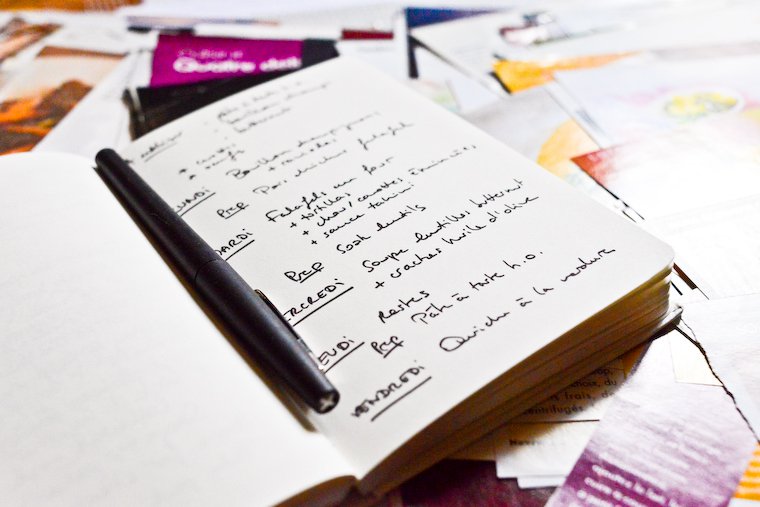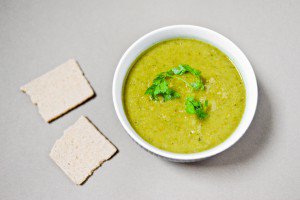I never dreamed I would one day become a meal planner.
For years and years, planning meals sounded achingly dull to me, and also pointless: I just kept a well-stocked pantry and fridge, and spontaneity was my middle name. In truth, I did formulate a plan for the fresh stuff I bought, but it was a fluid, unwritten one that was often altered or nixed when something came up, or I changed my mind, or I was short on time, or we felt like eating out.
And then, I had a kid.
I stuck to the same non-system for months, until I eventually realized it was no longer working for me. Rather than enjoying the delicious freedom of improvised cooking, as I had since my early twenties, I was feeling stressed trying to find time for meal preparation between work and child, and worst of all frustrated that I always seemed to be in a rush, cooking basic things that required no forethought and gave me no sense of accomplishment.
My cook’s soul was shriveling up, and meal planning was the obvious solution. A few months later, I am a much happier and more serene cook. I don’t plan our meals in writing every week — sometimes the mental plan is enough for me to wing it — but doing so regularly enough has helped me regain a sense of peace and control in the kitchen.
FREE PRINTABLE: You can download the meal planner I use to work out our weekly menus!
Meal Planning Tips: How I Do It
First of all, I only plan for meals I take with Maxence — my lunches are either simply assembled at home or eaten out — and in my household, breakfasts, desserts, and snacks can be trusted to happen satisfyingly without the need for planning.
I draw up my meal plan on Mondays, after I uncover the contents of my weekly vegetable delivery, and I also take into account:
- A quick inventory of pantry or freezer items that I feel like (or need) using, plus leftover ingredients or dishes from the previous week (say, a container of homemade stock, some pesto, a few scraps of dough…),
- The current list of things I’m inspired to cook,
- A rough schedule for the upcoming week, to know when we’ll be eating in or out or having guests over, on which nights I’ll have time to cook, etc.
I give it a think, look through my recipe collections online and offline, do some research as needed for extra information or inspiration, and come up with:
- A list of dishes and the days on which I plan to cook them, factoring in leftovers nights and wildcard meals (see below), and outlining what part(s) of those menus should work for our two-year-old,
- A list of advance prep steps that can or should be done the day before (cleaning vegetables, soaking chickpeas, mixing the dough for a pizza or quiche crust, taking an item out of the freezer to thaw…),
- A shopping list of missing ingredients, with the days I’ll be needing them so I know when to go to which shop.
This gives me a clear picture of what I need to do and when, so I can squeeze prep steps wherever they most readily fit in my schedule.
Read on for more on the 9 benefits and 7 “Yes, buts” of meal planning.
Meal Planning Tips: The 9 Benefits
- It makes life a lot simpler.
Once you get used to the process the meal plan can be drawn up in half an hour — unless of course you feel like daydreaming or get the urge to reorganize your clipped recipes by season, which I did a couple of weeks ago — and then it’s all about execution, saving time and brain juice for other pursuits.
- It’s the best way to actually cook from your cookbooks, bookmarked recipes, and magazine clippings.
I’ve written before about making the most of your cookbook collection, and now when you sit down to imagine your meals for the week, here’s your chance to call upon the most inspiring dishes and ideas.
- You make a more efficient use of your pantry reserves.
By regularly taking stock of what you have on hand and what needs using soon, and choosing recipes that call for those items.
- Picky eaters in your household?
I am told getting them involved in the meal planning — and implicitly signing off on that plan — is often helpful.
- It’s a sure path to a healthier diet.
Surprise, surprise, you’re much more likely to prepare and eat balanced, varied meals if you’ve planned for them.
- You’ll reduce food waste.
By purchasing only the foods you really need, actually cooking what you’ve purchased, and making the most of leftovers by working them into your plan.
- It saves money.
Not just by reducing waste, but also by limiting the number of occasions when you resort to take-out or expensive ready-made foods just because it’s late and you’re hungry and you don’t have fresh food in the house or the energy to figure out what to make with it.
- It serves as a cooking log.
If you keep all your weekly meal plans in the same notebook or file, which I recommend you do, you can refer to it later, reminding yourself of successful meals you’ve prepared and quickly generating ideas for future meal plans.
- The process helps you grow as a cook.
Instead of relying on the same safe recipes in your repertoire, you can decide to nudge yourself out of your comfort zone every once in a while, by scheduling a new type of dish or a new technique for a day when you’ll be in an adventurous mindset.
Ready to get started? Download the printable meal planner I use to work out our weekly menus!
Meal Planning Tips: The 7 “Yes, Buts” (with Matching Solutions)
- “Yes, but I find it daunting to come up with a whole new plan every week.”
If that’s the case, you can create a framework based on the types of foods you like to eat (say Monday is a big salad, Tuesday is fish, Wednesday is a quiche or pizza, Thursday is a stew of some kind, etc.) and you’ll simply fill in the blanks with seasonal specifics.
- “Yes, but I worry this will all be too much cooking for me.”
No one says you have to cook something every day; you can size the recipes you do make so they’ll feed you for several meals. I recently cooked the meatloaf from my friend Molly’s new memoir Delancey, and we got five (five!) meals out of it, incorporating it in a different way every time.
- “Yes, but I find myself with too many leftovers.”
Remember to account for them in your meal plan; I schedule a leftovers night on which we each compose a plate with various little scraps from previous meals, with the possible addition of a green salad, or a bit of bread and cheese. You can also pack your leftovers for lunch the next day or, if you hate eating the same thing two days in a row, freeze them and make them reappear (tadaaa!) a few weeks later.
- “Yes, but my schedule changes often and there’s no telling when I might be working late or meeting up with friends.”
You can underplan a little, to account for those meals you won’t be taking at home after all. And for those late nights, make sure you have a few shortcut recipes up your sleeve — dishes you can quickly whip up with ingredients from the freezer and pantry. I love making these spaghetti with crushed sardines, this pasta with peas and toasted almonds, or calamari and zucchini in peanut sauce.
- “Yes, but I have trouble sticking to the plan.”
Could it be that your plan is too ambitious? If so, you may need to plan for simpler, easier things — there is certainly no shame in that — and you can start by dipping into those five-ingredient recipes.
Or is it that you end up not in the mood for the food you’ve planned to cook? You can then keep your plan flexible, with meals that are easy to switch around: if you don’t feel like lentil soup on lentil soup night, maybe the grilled spatchcocked chicken will sound better?
- “Yes, but I prefer to go to the store or greenmarket with no shopping list so I can buy what looks best and most seasonal.”
I’m with you! You simply need to do your menu planning post-market run, and incorporate whatever lush greens you’ve scored. You might then find out that you’re missing a few ingredients to complete the plan, but you can always pick those up later.
- “Yes, but I can’t let go of the idea of spontaneous cooking.”
It is a good idea to plan one or several wildcard meals, for which you actually plan nothing at all, and which will be your opportunity to just open the fridge and whip something up that surprises even you. And if you’re that kind of a cook, my guess is this will happen whether or not you plan wildcard nights at all. But if you do schedule them, they are best wedged in toward the end of the week, so you won’t wreak havoc in your plan by accidentally using supplies earmarked for another recipe, and so you can use up leftovers to end your week neatly.
Join the conversation!
Do you plan your meals? If not, why not? If so, what works for you and what doesn’t?
Don’t forget! I have a FREE printable meal planner to help you work out your weekly menus!















